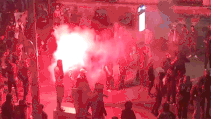Amidst mounting tensions with global nuclear powers, security experts warn that the United States' post-Cold War approach to countering nuclear threats is woefully inadequate. A new report highlights the urgent need to revamp America's nuclear arsenal to address the escalating nuclear capabilities of China, Russia, and North Korea.
In the aftermath of the Cold War, American policymakers focused on nuclear disarmament as the path to preventing a catastrophic nuclear event. However, a comprehensive report by the Heritage Foundation argues that this strategy has become obsolete in the face of an increasingly hostile international reality.
The report, titled "Building the Nuclear Arsenal of the 21st Century," warns that China and Russia have been rapidly expanding their nuclear arsenals, aiming to achieve nuclear parity or even advantage over the United States by the 2030s.

The Nuclear Shadow: Cold War Deterrence Fails to Address 21st-Century Threats
Robert Peters, a former special adviser for countering weapons of mass destruction in the Obama administration, emphasizes the dire consequences of this inaction. "A world where the United States suffers nuclear disadvantage, while our adversaries enjoy nuclear advantage, is a world where nuclear war is more likely."
The report outlines several immediate steps to strengthen U.S. nuclear deterrence. First, it recommends expanding the ballistic missile submarine force and increasing warheads on ground-based strategic deterrents.

The Nuclear Shadow: Cold War Deterrence Fails to Address 21st-Century Threats
Secondly, it calls for uploading non-strategic nuclear warheads from reserve stockpiles for existing theater capabilities. The United States currently has over 1,300 retired warheads that could be reactivated.
Thirdly, the report suggests updating U.S. force posture by potentially stationing additional nuclear weapons across Europe and introducing them to the Western Pacific.

The Nuclear Shadow: Cold War Deterrence Fails to Address 21st-Century Threats
The concerns over nuclear security intensified after Russia withdrew from the 2010 New START treaty in 2023. The treaty, signed by President Obama and President Putin, expanded the 1991 Strategic Arms Reduction Treaty and limited the number of warheads the U.S. and Russia could deploy.
China's unchecked nuclear expansion has also raised alarms. While Beijing is believed to have a stockpile of 500 warheads, experts fear its rapid growth. North Korea is also reported to possess 50 nuclear warheads.

The Nuclear Shadow: Cold War Deterrence Fails to Address 21st-Century Threats
The traditional strategy of deterrence through threats of punishment, while still necessary, is no longer sufficient to address the new threats. The report argues that a new approach is needed that also eliminates potential escalation pathways for adversaries.
Despite the high cost of nuclear deterrence, the report maintains that it is a far more affordable option than countering a nuclear war. "To prevent a war and ultimately prevent strategic attack... the United States must build and field a nuclear arsenal that is credible."

The Nuclear Shadow: Cold War Deterrence Fails to Address 21st-Century Threats
The report acknowledges the importance of arms control and nonproliferation goals, but emphasizes that for the time being, the global security environment does not lend itself to treaty-based risk reduction or confidence-building measures.
The United States and Russia still account for 90% of the world's nuclear stockpiles, but other countries such as France, the U.K., India, Pakistan, and Israel also possess nuclear weapons, contributing to a total of more than 12,100 warheads worldwide.
The report is intended to be shared with the incoming administration following the November election, regardless of who wins. It serves as a stark reminder of the urgent need to address the evolving nuclear landscape and ensure a credible and robust American nuclear deterrent.










